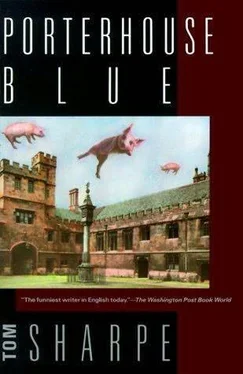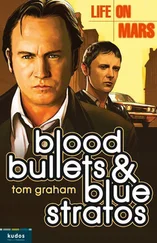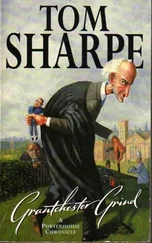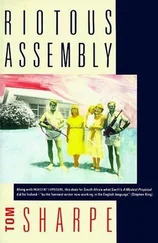“A pink gin,” he said finally, with a malicious gleam in his eye.
“Zola,” said the General promptly and reached up for a copy of Nana . The Dean tried to collect his thoughts. Sir Cathcart’s flippancy had begun to erode his fervour. He sipped his gin in silence while the General lit a cheroot.
“Trouble with you academic wallahs,” said Sir Cathcart finally, evidently sensing the Dean’s confusion, “is you take things too seriously.”
“This is a serious matter,” said the Dean.
“Didn’t say it wasn’t,” Sir Cathcart told him. “What I said was you take it seriously. Bad mistake. Ever hear the joke Goering told his psychiatrist in the prison at Nuremberg?”
The Dean shook his head.
“About different nationalities. Very revealing,” Sir Cathcart went on. “Take one German and what have you got?”
“And what have you got?”
“A good worker. Take two Germans and you’ve got a Bund. Three Germans and you’ve a war.”
The Dean smiled obediently. “Very amusing,” he said, “but I really don’t see what this has to do with the College.”
“Haven’t finished yet. Take one Italian and you’ve a tenor. Two Italians a retreat. Three Italians unconditional surrender. Take one Englishman and you’ve an idiot. Two Englishmen a club and three Englishmen an Empire.”
“Very funny,” said the Dean, “but a little out of date, don’t you think? We seem to have mislaid the Empire en route.”
“Forgot to be idiots,” said Sir Cathcart. “Great mistake. Did bloody well when we were chinless wonders. Done bloody badly since. The Sir Godbers of this world have upset the applecart. Look serious and are fools. Different in the old days. Looked fools and were serious. Confused the foreigners. Ribbentrop came over to London. Heil Hitlered the King. Went back to Germany convinced we were decadent. Got a thrashing for his pains in ’40. Hanged for that slip-up. Should have looked a bit closer. Mind you, it wouldn’t have helped him. Went on appearances.” Sir Cathcart chuckled to himself and eyed the Dean.
“You may be right at that,” said the Dean grudgingly. “And certainly the Master is a fool.”
“Clever fellows often are,” Sir Cathcart said. “Got one-track minds. Have to have, I suppose, to do so well. Great handicap, though. In life I mean. Get so carried away with what’s going on inside their own silly heads they can’t cope with what’s going on outside. Don’t know about life. Don’t know about people. Got no nose for it.”
The Dean sipped his gin and tried to follow the train of Sir Cathcart’s thoughts. A new mellowness had begun to steal over him and he had the feeling, it was no more than a mere glimmer, that somewhere in the General’s rambling and staccato utterances there was a thread that was leading slowly to an idea. Something about the General’s manner as he helped himself to a third whisky and the Dean to a second gin and bitters suggested it. Something like a sparkle of cunning in the bloodshot eyes and a twitch of his veined snout and the bristles of his ginger whiskers which reminded the Dean of an old animal, scarred but undefeated. The Dean began to suspect that he had underestimated Sir Cathcart D’Eath. He accepted one of the General’s cheroots and puffed it slowly.
“As I was saying,” Sir Cathcart continued, settling once more into his chair, “we’ve forgotten the natural advantages of idiocy. Puts the other fellow off, you see. Can’t take you seriously. Good thing. Then when he’s off guard you give it to him in the goolies. Never fails. Out like a light. Want to do the same with this Godber fellow.”
“I really hadn’t visualized going to quite such lengths,” said the Dean doubtfully.
“Shouldn’t think he’s got any,” said the General, “Wife certainly doesn’t look up to much. Scrawny sort of woman. Bad complexion. Not fond of boys, is he?”
The Dean shuddered. “That at least we’ve been spared,” he said.
“Pity,” said Sir Cathcart. “Useful bait, boys.”
“Bait?” asked the Dean.
“Bait the trap.”
“Trap?”
“Got to have a trap. Weak spot. Bound to have one. What?” said the General. “Bleating of the sheep excites the tiger. Stalky . Great book.” He got up from his chair and crossed to the window and stared out into the darkness while the Dean, who had been trying to keep up with his train of thought, wondered if he should tell Sir Cathcart that Lavengro had nothing to do with Spain. On the whole he thought not. Sir Cathcart was too set in his ways.
“I forgot to mention it earlier,” he said at last, “but the Master also intends to put Rhyder Street up for sale.”
Sir Cathcart, who had become immersed in his own reflection in the window, turned and stood glowering down at him. “Rhyder Street?”
“He wants to use the money for the restoration of the Tower,” the Dean explained. “It’s old College property and rather run down. The College servants live there.”
The General sat down and fiddled with his moustache. “Skullion live there?” he asked. The Dean nodded. “Skullion, the Chef, the under-porter, the gardener, people like that.”
“Can’t have that. Got to stable them somewhere,” said the General. He helped himself to a fourth whisky. “Can’t turn them out into the street. Old retainers. Wouldn’t look good,” and his eyes which a moment before had been dark suddenly glittered. “Not a bad idea either.”
“I must say, Cathcart,” said the Dean, “I do wish you would not jump about so. What do you mean? ‘Wouldn’t look good’ and ‘Not a bad idea either’. The two statements don’t go together.”
“Looks bad for Sir Godber,” said the General. “Bad publicity for a socialist. Headlines. See them now. Wouldn’t dare. Got him.”
Slowly and dimly, through the shrapnel of Sir Cathcart’s utterances, the Dean perceived the drift of his thought.
“Ah,” he said.
The General winked a dreadful eye. “Something there, eh?” he asked.
The Dean leant forward eagerly. “Have you ever heard of a fellow called Carrington? Cornelius Carrington? Conservationist. TV Personality.”
He was aware that the infection of the General’s staccato had finally taken hold of him but the thought was lost in the excitement of the moment. Sir Cathcart’s eyes were gleaming brightly now and his nostrils were flared like those of a bronze warhorse.
“Just the fellow. An OP. Up his street. Couldn’t do better. Nasty piece of work.”
“Right,” said the Dean. “Can you arrange it?”
“Invite him up. Delighted to come. Snob. Give him the scent and off he’ll go.”
The Dean finished his gin with a contented smile.
“It’s just the sort of situation he likes,” he said, “and although I deplore the thought of any more publicity – that wretched fellow Zipser gave us a lot of trouble in that direction you know – I rather fancy friend Carrington will give Sir Godber cause for thought. You definitely think he’ll come?”
“Jump at the opportunity. I’ll see to that. Same club. Can’t think why. Should have been blackballed,” said the General. “Fix it tomorrow.”
By the time the Dean left Coft Castle that evening he was a happier man. As he tottered out of his car in time for dinner and passed the Porter’s Lodge he noticed Skullion sitting staring into the gas fire. “Must ask him how we did,” the Dean muttered and went into the Porter’s Lodge.
“Ah, Skullion,” he said as the porter got to his feet, “I wasn’t able to be at the Bumps this afternoon. How did it go?”
“Rowed over, sir,” said Skullion dejectedly.
The Dean shook his head sadly.
“What a pity,” he said, “I was rather hoping we’d do better today. Still there is always a chance in May.”
Читать дальше












